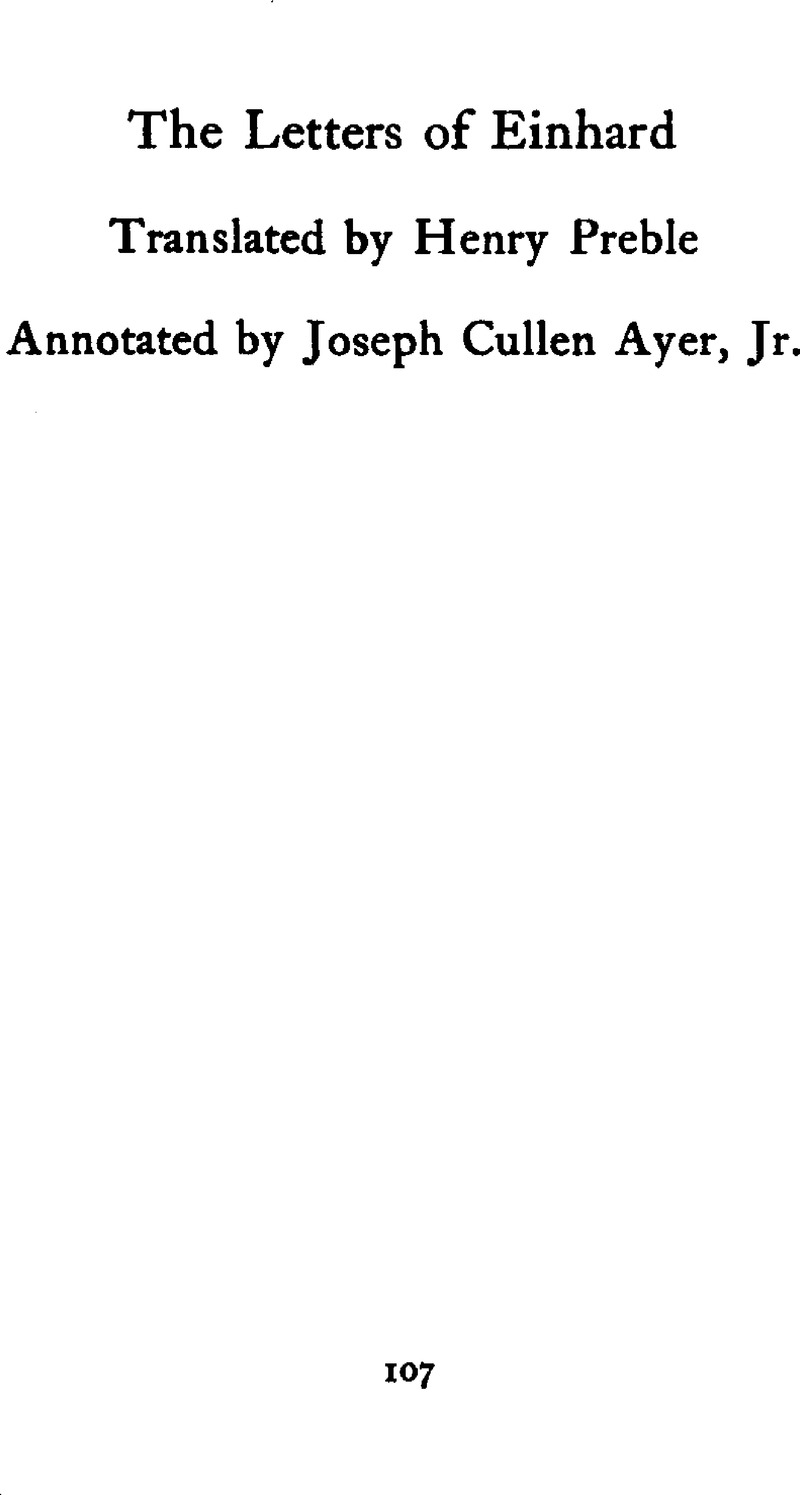No CrossRef data available.
Article contents
The Letters of Einhard
Published online by Cambridge University Press: 12 January 2009
Abstract

- Type
- Supplementary article published in 1913 reprint of Vol 1, series 2
- Information
- Copyright
- Copyright © American Society for Church History 1909
References
page 109 note 1 Cf. Cath. Encyc. 1.17, col. 2; PRE*. 23 (1913), 37i. 45~5
page 112 note 1 I. e. property held on any form of feudal tenure.
page 113 note 1 Weissenburg.
page 113 note 2 The successor of Bernharius both at Weissenburg and in the bishopric of Worms.
page 113 note 3 The syntax of the passage is mixed, and I have used N, Na, Ni, to distinguish the different persons given as N.—H. P.
page 113 note 4 This obscure sentence appears to mean that Folquicus promised before witnesses that he would consent to accept the election, and that “my lord N.” assented to the election.
page 114 note 1 Abbey at Maastricht which Einhard held as abbot.
page 114 note 2 Wife of Einhard.
page 114 note 3 See Encyc. Brit., XI. Ed., s. v. Vidame.
page 115 note 1 N. W. of Maastricht.
page 115 note 2 Comes Palatii, whose duty it was to assist in the administration of justice: of. Hincmar, De Ordine Palatii, c. 19.
page 116 note 1 Cf. Ep. 6; Gebuin and Geboin appear to be the same person.
page 116 note 2 Nature wholly uncertain.
page 116 note 3 Near Liège, on the Meuse.
page 117 note 1 Afterwards called Seligensladt.
page 117 note 2 In Hesse, 16 miles S. W. of Cassel.
page 118 note 1 The relics were first deposited at Michelstadt in 827 but removed to Obermūhlheim in consequence of revelations made to Einhard.
page 118 note 2 Archbishop of Mainz, 826–847.
page 118 note 3 The cathedral church of Mainz was dedicated to St. Martin. His equestrian statue still stands on the roof of the choir.
page 118 note 4 Reference probably to the serious illness of 829 which Einhard mentions in several epistles.
page 121 note 1 The conclusion wanting in the manuscript.
page 121 note 2 Al Hakem I, emir of Cordova, 796–822.
page 122 note 1 Judith, second wife of Ludwig the Pious, married 819.
page 124 note 1 Cf. Hist. Translations SS. Marcellini et Petri, V. 47. The angel Gabriel had taken the form of St. Marcellinus and appeared to a blind man giving him a revelation as to the affairs of the kingdom The blind man went to Einhard who reduced the revelation to writing and presented it to the Emperor.
page 126 note 1 A term at that time not customarily restricted to the Pope.
page 126 note 2 The assembly at Nimwegen, October 830, at which Ludwig was restored by his sons, Pippin and Ludwig, who were jealous of the power of Lothar.
page 126 note 3 Possibly Geboin; v. Epp. 6, 7, 14.
page 128 note 1 Possibly Hruotbert, cf. Ep. 7.
page 129 note 1 Probably men belonging to the monastery of St. Bavon at Ghent.
page 129 note 2 Norman pirates always threatened the northern coast.
page 129 note 3 september, 832. This places the date of letter in latter part of year.
page 129 note 4 Fine for not appearing when summoned.
page 129 note 5 In Wūrzburg.
page 130 note 1 Conjecturally supplied by K. Hampe, editor of text in M. G. H.
page 130 note 2 Made at the Field of Lies, June 30, 833.
page 130 note 3 According to the law of 806, made by Charles when the first division of the Empire was proposed, subjects of one ruler might not hold a benefice from the ruler of another division.
page 131 note 1 Irmingarde.
page 131 note 2 This N. represents “Frumold” of Ep. 27; N(a) is used for another person, indicated in text by N.
page 132 note 1 Tournai was under Lothar; the country beyond the Rhine, under Ludwig II.
page 133 note 1 Here as elsewhere a secular fief although in this case held by a clergyman.
page 136 note 1 Folco, abbot of S. Wandrille, or Fontanelle, 834–845
page 138 note 1 Reading doubtful, as also identification with the abbey of that name near Paris.
page 139 note 1 Born 814, scholar at Fulda under Hrabanus Maurus, 830–836, abbot of Ferrières 842, died 862.
page 139 note 2 I.e. SS. Marcellinus and Peter.
page 139 note 3 Einhard was actually a very small man.
page 142 note 1 Cf. Jonah 3:10.
page 142 note 2 Cf. Jer. 18:2 ff.
page 142 note 3 june 17, 837.
page 143 note 1 I.e. the Frankish territory east of the Rhine.
page 143 note 2 Abbot of Fulda 822–842.
page 144 note 1 Archbishop of Mainz 826–847.
page 144 note 2 I.e. of the Monastery of Fulda.
page 144 note 3 Manniacum, identification uncertain; Teulet identifies the place as in text.
page 144 note 4 Lat. Chorepiscopus; v. Hinschius, Kirchenrecht, ii., 164 ff.
page 145 note 1 Archbishop of Trier 814–847.
page 145 note 2 Almost any church building was called a basilica.
page 145 note 3 Cf. Ep.41.
page 145 note 4 Serfs might not marry without consent of their mastérs and paying a maritagium; cf. Ep. 37.
page 146 note 1 Cf.Epp.8and41.
page 146 note 2 I. e. of the see of Mainz.
page 146 note 3 Probably either Haibach or Aschaffenburg.
page 147 note 1 So text, but ministerium, i. e. jurisdiction, makes better sense (so Teulet). The title of the person addressed bears this out.
page 147 note 2 Cf, Kirchenrecht, ii., 614 ff; Encyc. Brit., ed. xi., s.v. Advocate.
page 148 note 1 This may refer to Marcellinus and Peter; if so the date is after 828.
page 148 note 2 Cf.Ep.5.
page 150 note 1 In Maastricht.
page 150 note 2 Both at Ghent.
page 151 note 1 October Ist.
page 151 note 2 Possibly Hrabanus Maurus.
page 152 note 1 Einhard was occupied while at Court in erecting churches and palaces for both Charles and Ludwig.
page 152 note 2 Reading obscure.
page 153 note 1 There is no internal evidence that R. was more than a pupil.
page 154 note 1 Reading doubtful.
page 155 note 1 Text in bad condition.
page 155 note 2 Cf. Matt. 14:30–32.
page 156 note 1 Prebend is any salary or stated income either in money or in kind.
page 157 note 1 Possibly Walafrid Strabo, chaplain 829–838.
page 157 note 2 Possibly Judith.
page 157 note 3 Here, as elsewhere in these letters, the honorifics and terms of address are not titles.
page 157 note 4 Lens-St. Servais in the province of Liège.
page 157 note 5 The lead was frequently stripped from roofs and sold; dilapidation speedily followed loss of lead.




